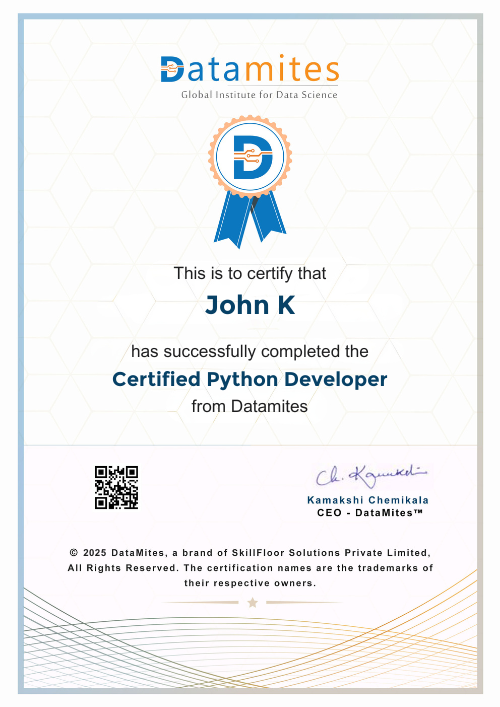Instructor Led Live Online
Self Learning + Live Mentoring
Customize Your Training

• Introduction of python
• Installation of Python and IDE
• Python Variables
• Python basic data types
• Number & Booleans, strings
• Arithmetic Operators
• Comparison Operators
• Assignment Operators
• IF Conditional statement
• IF-ELSE
• NESTED IF
• Python Loops basics
• WHILE Statement
• FOR statements
• BREAK and CONTINUE statements
• Basic data structure in python
• Basics of List
• List: Object, methods
• Tuple: Object, methods
• Sets: Object, methods
• Dictionary: Object, methods
• Functions basics
• Function Parameter passing
• Lambda functions
• Map, reduce, filter functions
• Decorators
• Generators
• Context Managers
• Metaclasses
• Inheritance and Polymorphism
• Encapsulation and Abstraction
• Class methods and static methods
• Special (magic/dunder) methods
• Property decorators - getters, setters, and deletes
• Working with files
• Reading and writing files
• Buffered read and write
• Other file methods
• Logging & Debugger
• Modules and import statements
• SQL Basics
• Creating DB Table
• INSERT, READ, UPDATE, DELETE
• Introduction to MongoDB
• CRUD operations in MongoDB
• namedtuple(), deque, ChainMap,
• Counter, OrderedDict, defaultdict,
• UserDict, UserList, UserString
• Exceptions handling with try-except
• Custom exception handling
• List of general use exception
• Best practice exception handling
• Generators, Iterators
• The Functions any and all
• With Statement
• Data Compression
• A Daytime Server
• Clients and Servers
• The Client and Server Programs
• Classes and Threads
• Multi-threading; thread life cycle
• Regular Expression Syntax
• Group, Split and wildcards
• Quantifiers
• Match, Search and Find all methods
• Character Sequence
• Introduction to OpenCV, Installation
• Basic Operations on Images
• Image Filtering
• Image Classification
• Introduction to GIT
• Basic Git commands
• Introduction to Flask and Installation
• Creating project
• Routing,templates, forms and database integration
• Deployment on render
• Django Introduction and Installation
• Creating a Project
• Django Architecture and File Structure
• Folder Structure, First Django project
• Database and Views, Static Files and Forms
• URL Mapping and Routing
• Defining Models and Relationships
• Database Migrations and Schema Changes
• Querying Data using Django ORM
• Model Forms and Form Validation
• HTML Forms in Django
• Model Forms and Form Validation
• Formsets and Inline Formsets
• File Uploads and Validation
• Deploying Django Applications
• Hosting Options (e.g., Heroku, AWS)
• Project Showcasing and Review
Python boasts dynamic typing, automatic memory management, and support for multiple programming styles including object-oriented, procedural, and functional. Additionally, its rich standard library facilitates seamless integration with other languages.
Rwanda witnesses a high demand for python developers across diverse industries such as web development, data science, and machine learning. Companies actively seek proficient Python developers to fulfill their technological requirements.
While a bachelor's degree in computer science or a related field is preferred, Polish employers also consider candidates with relevant certifications, bootcamp training, or demonstrable Python programming skills and experience.
Common Python interview topics encompass data types, control structures, functions, object-oriented programming principles, modules, exception handling, and utilization of Python-specific libraries and frameworks.
Python is renowned for its simplicity and readability, functioning as a high-level, interpreted language adaptable to various programming paradigms. Its extensive standard library further enhances its versatility.
Employers seek Python developers with robust programming fundamentals, familiarity with Python frameworks and libraries, experience in web development or data science, problem-solving prowess, teamwork, and effective communication abilities.
Python finds utility in environmental science for data analysis, modeling, visualization, and simulation purposes. It aids researchers in analyzing environmental data, predicting trends, and devising solutions to environmental challenges.
In Rwanda, Python developers enjoy promising career prospects, with opportunities available across various sectors including IT, finance, healthcare, and government. Roles range from software engineers to data analysts and web developers.
Python aids in retail through inventory management, sales forecasting, customer analytics, recommendation systems, and automation of business processes. Its flexibility and extensive libraries facilitate the development of retail-specific applications and solutions.
To attain certification as a Python developer, one can enroll in reputable certification programs offered online or by educational institutions. Comprehensive preparation involving studying Python concepts, coding practice, and mock exams is essential for success.
Transitioning into Python programming entails learning fundamental concepts through online tutorials, courses, or books, followed by consistent coding practice, personal project work, and seeking mentorship or community engagement for accelerated learning.
Python certifications validate proficiency in Python programming, bolstering one's credibility and employability in Rwanda's competitive job market. They serve as a testament to expertise in Python development, highly valued by employers.
Switching to a Python developer role involves mastering Python fundamentals, gaining hands-on experience through projects or internships, building a portfolio, networking with professionals, and applying for entry-level positions in Python development.
Python plays a vital role in data science for tasks like data manipulation, analysis, visualization, machine learning, and artificial intelligence. Widely used libraries such as Pandas, NumPy, Matplotlib, and scikit-learn are instrumental in data science projects.
Python developers in Rwanda enjoy highly competitive salaries, with an average yearly income of 8,010,000 RWF, as reported by Salary Explorer.
Indeed, Python is widely utilized in cybersecurity for tasks such as penetration testing, network security analysis, malware analysis, and security automation. Its simplicity, readability, and rich libraries make it ideal for developing security tools and scripts.
Python libraries consist of pre-written code modules that extend the language's capabilities for specific tasks, while frameworks offer structured sets of tools and libraries for application development. Examples include Django and Flask for web development and NumPy and Pandas for data manipulation.
To commence a Python development career in Rwanda, one should begin by mastering Python fundamentals, exploring its applications, gaining practical experience through projects or internships, networking, and applying for entry-level positions.
Python programs can be run by installing the Python interpreter and executing scripts using the command line or an integrated development environment (IDE) such as PyCharm, VS Code, or Jupyter Notebook.
Python contributes to web development through server-side scripting, building web applications, handling HTTP requests, interacting with databases, and utilizing web frameworks like Django, Flask, and Pyramid to streamline development processes and enhance security.
DataMites' Python Developer Course in Rwanda covers a diverse range of Python programming subjects, complemented by hands-on exposure through internships and live projects with IT companies to prepare participants for industry requirements.
Yes, upon completing Python classes in Rwanda with DataMites, participants receive IABAC Certification, validating their proficiency in Python programming and enhancing their credibility in the industry.
To bolster your Python programming abilities in Rwanda, consider enrolling in DataMites' courses, which offer customized training suitable for individuals at all skill levels, providing practical learning experiences to reinforce your expertise.
The Flexi-Pass feature within DataMites' Python training in Rwanda allows participants to choose between weekday or weekend batches, providing flexibility to manage their learning alongside other commitments effectively.
DataMites' Python for Data Science Course in Rwanda explores Python's applications in data manipulation, analysis, and machine learning, equipping participants with practical skills applicable to real-world data scenarios.
The Python Developer Course in Rwanda at DataMites spans four months, comprising 400 learning hours, allowing participants ample time to thoroughly grasp Python concepts and excel in software development.
In Rwanda, if a participant misses a training session, they can access recorded sessions and course materials online and schedule makeup sessions to maintain their learning progress.
DataMites' Python for Deep Learning Course in Rwanda introduces participants to deep learning concepts, enabling them to develop and train deep neural networks using Python libraries such as TensorFlow and PyTorch.
DataMites' Data Mining with Python Training in Rwanda delves into data mining techniques using Python, empowering participants to extract insights from extensive datasets and make informed decisions.
DataMites' Python for Machine Learning Course in Rwanda covers various machine learning algorithms and their implementation using Python's Scikit-Learn package, fostering proficiency in building ML applications.
Yes, DataMites offers a demo class for prospective participants in Rwanda, allowing them to experience the teaching approach and assess the course content before making a commitment.
Yes, DataMites offers Python courses with internship opportunities in Rwanda, enabling participants to gain practical experience and enhance their employability in the field.
Participants are required to bring valid photo identification proof, such as a national ID card or driver's license, to obtain the participation certificate during Python training sessions in Rwanda.
The Python training fee in Rwanda at DataMites ranges from RWF 212,868 to RWF 551,314, ensuring accessibility and affordability for participants with varying budget constraints.
Yes, DataMites includes 10 capstone projects and 1 live project as part of its Python Courses in Rwanda, providing practical experience and opportunities to apply Python skills in real-world scenarios.
DataMites' Python developer training in Rwanda incorporates essential tools such as Anaconda, Google Colab, Numpy, Pandas, PyCharm, and Flask, facilitating effective Python application development.
DataMites' career mentoring sessions in Rwanda offer tailored guidance on resume building, interview preparation, and career goal setting, delivered by industry experts to assist participants in advancing their careers.
Opting for DataMites for Python Course Training in Rwanda provides several benefits, including globally recognized certifications, expert faculty, updated curriculum, and practical projects, ensuring a comprehensive learning experience aligned with industry standards.
DataMites Python training courses in Rwanda accept various payment methods, including cash, debit/credit cards, EMI, PayPal, and net banking, ensuring convenience for participants.
DataMites' Python Developer Training in Rwanda caters to individuals with various programming backgrounds, offering them the opportunity to acquire essential skills for Python development roles.
The DataMites Placement Assistance Team(PAT) facilitates the aspirants in taking all the necessary steps in starting their career in Data Science. Some of the services provided by PAT are: -
The DataMites Placement Assistance Team(PAT) conducts sessions on career mentoring for the aspirants with a view of helping them realize the purpose they have to serve when they step into the corporate world. The students are guided by industry experts about the various possibilities in the Data Science career, this will help the aspirants to draw a clear picture of the career options available. Also, they will be made knowledgeable about the various obstacles they are likely to face as a fresher in the field, and how they can tackle.
No, PAT does not promise a job, but it helps the aspirants to build the required potential needed in landing a career. The aspirants can capitalize on the acquired skills, in the long run, to a successful career in Data Science.



